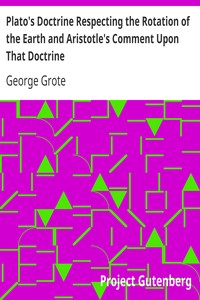| Summary |
"Plato's Doctrine Respecting the Rotation of the Earth and Aristotle's Comment upon that Doctrine" by George Grote is a scholarly examination of philosophical interpretations concerning the Earth's rotation as presented in Platonic and Aristotelian texts. Written in the mid-19th century, this scientific publication critically engages with ancient cosmological theories, particularly focusing on the interpretations of Plato's "Timaeus" regarding the Earth's movement. The book delves into the historical context of these doctrines and explores the implications of Earth's rotation in the framework of Plato and Aristotle's respective philosophies. In this dissertation, Grote investigates three main questions: whether Plato affirms or implies the doctrine of the Earth's rotation in "Timaeus," the sense in which he does so, and the cosmical role assigned to the Earth by Plato. Throughout the arguments, Grote highlights the differing interpretations and debates among ancient philosophers, notably Aristotle, who critiques the possibility of Earth's rotation. He elucidates how Plato conceptualized the Earth's position relative to a cosmical axis while examining the philosophical implications of these ancient theories against the backdrop of contemporary understandings of astronomy. Ultimately, Grote argues that while Plato's language may imply the Earth's rotation, it serves more as an indirect consequence of its role in maintaining the cosmic order, rather than an outright affirmation of motion as understood in modern terms. (This is an automatically generated summary.)
|

